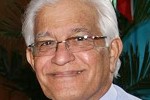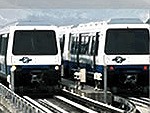By Stephen Kangal
January 24, 2007
 Self styled and pathological struggler, Mr. Basdeo Panday who enjoys the unique distinction of having mashed up each and every recent experiment in electoral-based accommodation is again erecting another ego-centric unity platform carded for 25 January. As usual, unity, whatever that means is to be found in the mind of Panday, must be crafted under his skewed leadership and on his egocentric driven terms and conditions.
Self styled and pathological struggler, Mr. Basdeo Panday who enjoys the unique distinction of having mashed up each and every recent experiment in electoral-based accommodation is again erecting another ego-centric unity platform carded for 25 January. As usual, unity, whatever that means is to be found in the mind of Panday, must be crafted under his skewed leadership and on his egocentric driven terms and conditions.
Continue reading Panday’s Zero Credibility On Unity

 There are two additional ways we do not want, definitely do not want, to follow the U.S. prison system.
There are two additional ways we do not want, definitely do not want, to follow the U.S. prison system.  A self-imposed media embargo seems to have overtaken Minister Colm Imbert lately on the tenuous fate of his TRRP. This prognosis has been reinforced by the negative and depressing body language that he displayed while communicating to the press at Whitehall on the Interchange. I am coming to the intuitive conclusion that Cabinet seems to have ordered secretly a pre-emptive moratorium against the TRRP, in an election year, to avoid any further disastrous fallout from another major reversal and embarrassment while the wounds inflicted by the Chatham debacle are still fresh, politically painful and electorally threatening.
A self-imposed media embargo seems to have overtaken Minister Colm Imbert lately on the tenuous fate of his TRRP. This prognosis has been reinforced by the negative and depressing body language that he displayed while communicating to the press at Whitehall on the Interchange. I am coming to the intuitive conclusion that Cabinet seems to have ordered secretly a pre-emptive moratorium against the TRRP, in an election year, to avoid any further disastrous fallout from another major reversal and embarrassment while the wounds inflicted by the Chatham debacle are still fresh, politically painful and electorally threatening. Democrats must celebrate and document for posterity this defining and watershed moment in the victorious enactment of people’s power by our Chatham folk. The script of the politics of post-Chatham T&T has been rewritten by the simple, rural, ordinary God-fearing people of Chatham. Their message to us is that State arrogance, insensitivity and unilateralism have no place in the new people centred political order that they have now ushered in. No government can now afford to underestimate the will and determination of the salt of the earth to defend and conserve the integrity of their living spaces as well as their inalienable right to be consulted and heard in democratic T&T.
Democrats must celebrate and document for posterity this defining and watershed moment in the victorious enactment of people’s power by our Chatham folk. The script of the politics of post-Chatham T&T has been rewritten by the simple, rural, ordinary God-fearing people of Chatham. Their message to us is that State arrogance, insensitivity and unilateralism have no place in the new people centred political order that they have now ushered in. No government can now afford to underestimate the will and determination of the salt of the earth to defend and conserve the integrity of their living spaces as well as their inalienable right to be consulted and heard in democratic T&T. I have never ceased to agonise in mental pain at the continuing undue pressures being exerted on our Indian community to exercise constant and eternal vigilance geared to curb and correct the natural predilection of some public decision-makers in Trinidad and Tobago to exclude its presence from public symbols that claim by depicting selectively to represent the cultural diversity of our multicultural landscape. The absence of Indian names of public buildings and notably roadways are relevant in this regard.
I have never ceased to agonise in mental pain at the continuing undue pressures being exerted on our Indian community to exercise constant and eternal vigilance geared to curb and correct the natural predilection of some public decision-makers in Trinidad and Tobago to exclude its presence from public symbols that claim by depicting selectively to represent the cultural diversity of our multicultural landscape. The absence of Indian names of public buildings and notably roadways are relevant in this regard.